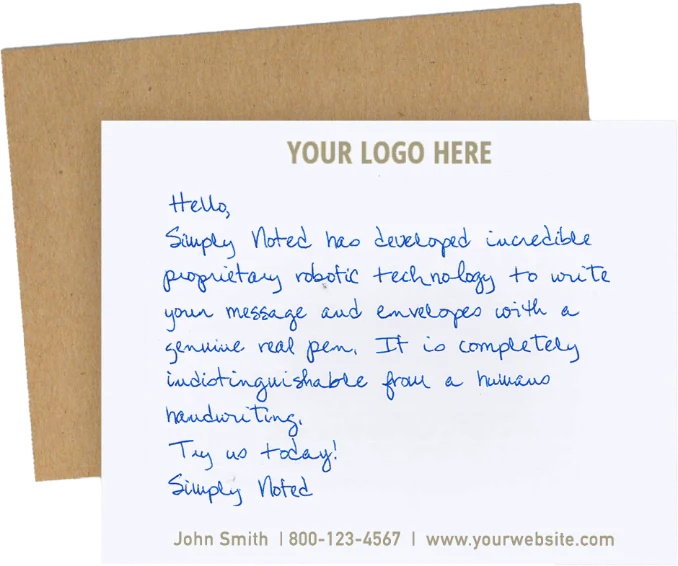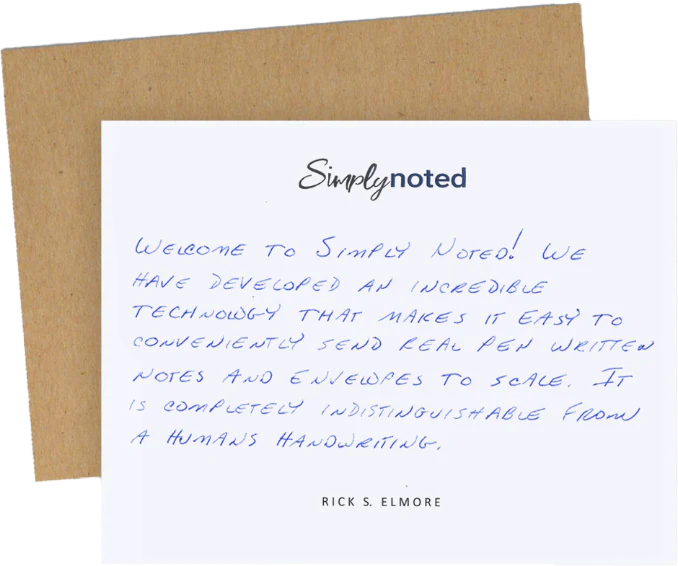How to Connect Emotionally to Motivate Action

Connect Emotionally to Motivate Action
It’s easier to motivate action in your customers when you connect with them emotionally. When people feel a personal connection to a business they are supporting, they are more likely to be invested in the company’s success. They want to see it thrive and will be more likely to take actions that support this goal, such as recommending the company to their friends or buying its products.
There are many ways businesses can connect emotionally with their customers. One of the most effective is handwritten notes. A handwritten note shows that a business took the time to personally reach out to its customer, something that is greatly appreciated. It also helps forge a stronger emotional connection, which can result in increased loyalty and sales.
Why Are Emotional Appeals Effective Motivators?
When you're attempting to compel action, you have two main tactics at your disposal — logic, and emotion. Using logical arguments you can try to convince your target to take the action you desire, but this can be an uphill battle. You'll be fighting against all of their preconceived notions. It can be very challenging to change someone's mind using logic alone.
Emotional arguments, on the other hand, bypass emotion and get right at the heart of how we think. It's the reason why people watch soap operas and feel so invested in fictional relationships. They are connecting on an emotional level. This connection is powerful because it's what motivates action. When we feel connected to something or someone, we naturally want to help them succeed.
Consider how many times you've been moved powerfully by a logical argument. Probably not often. You might agree with the arguments, but they don't affect you on a viceral level. By contrast, how often are you moved to action by a particularly heartwrenching scene? The connection is deeper and far more instantaneous when emotional chords are plucked. Logic alone is often fruitless. Logic backed up by an emotional connection can be very potent indeed.

Handwritten Notes Are One Way to Connect Emotionally with Customers
Handwritten notes can make a powerful impression on their readers because of their immediacy. The connection is palpable between the hands of the person who wrote the letter and those holding it and reading. Both of you have touched the card, physically and emotionally.
Handwritten notes can strengthen a customer's perception of your company as caring and professional. Customers will appreciate knowing that a real person, not a machine, created it (unless it's a Simply Noted handwriting machine, which is just as good!) It reinforces the fact that you are looking for a personal relationship with them. A handwritten note can make customers feel welcome to your business and shows how much care is going into the products and services you offer.
SEE ALSO: Why Are Handwritten Notes So Important?
Handwritten Notes Show Personalization in a Big Business
In a big business, it can be hard to show individual attention with all the products and customers that need tending. Handwritten notes are a great way to connect on an emotional level. They make a customer feel like a person and not a number. The biggest business in the world can be personal to each individual customer making them feel special.
And with Simply Noted, handwritten notes can be created at scale. We've built the most powerful network of automated handwriting robots available. Our exclusive "Infinity" fonts recreate all of the subtle details that make the difference between a standard font and real handwriting. Your customers won't know the difference, which means you get the connection available from handwritten notes without all of the hassles.

Identify Your Customers' Pain Points and Solve Them
Offering a list of features and benefits is a logic-oriented communication strategy. Solving pain points, on the other hand, directly addresses the major issues that are causing your prospects to suffer. This is a more immediate route toward action.
Step 1: Search for Your Potential Customers' Pain Points Online
You can find out a lot about how to make your product or service more appealing by searching for keywords related to it on the internet. You can also scan social media postings around your product or service area to determine what's bothering people. Look for the common pain points that all of them share.
Step 2: Ask Your Customers Directly
Once you have an idea of the keywords that are related to your product or service, ask prospects and existing customers about them. Find out from existing customers what motivated them, on an emotional level, to make a purchase. Find out what keeps them interested.
Step 3: Solve Pain Points in your Communication
You now know the real problems people are facing. Think about how your product or service can solve these problems, and make this clear in all of your marketing materials.
Become a Great Storyteller
Humans are born storytellers. Great stories have a timeless appeal and emotionally engage their audience. They help hold the audience's interest by making an emotional connection as well as communicating concepts and ideas accessibly.
Storytelling engages more regions in the brain than facts and figures alone. By weaving a compelling story about your offerings you'll craft more persuasive communications that give their readers a strong reason to act.
People also remember stories longer than they do facts and figures. If you can incorporate your product or service into a good story, you'll be far more likely to connect with your audience and have them retain your desired call to action.

The Power of Reciprocity
You can also use the principle of reciprocity to motivate action. Research shows that when you give something to someone, they'll feel compelled to return the gift in some way. If you offer a free sample and tell a story about how it's helping someone's life they'll feel a mild compulsion to buy it again.
Reciprocity is another reason handwritten notes are so effective. Because of its inherent emotional value, the note is viewed as a gift, even if subconsciously. Your prospects will feel an obligation to respond simply because you took the time to handwrite them a letter.
They don't need to know you actually used Simply Noted. We won't tell.























